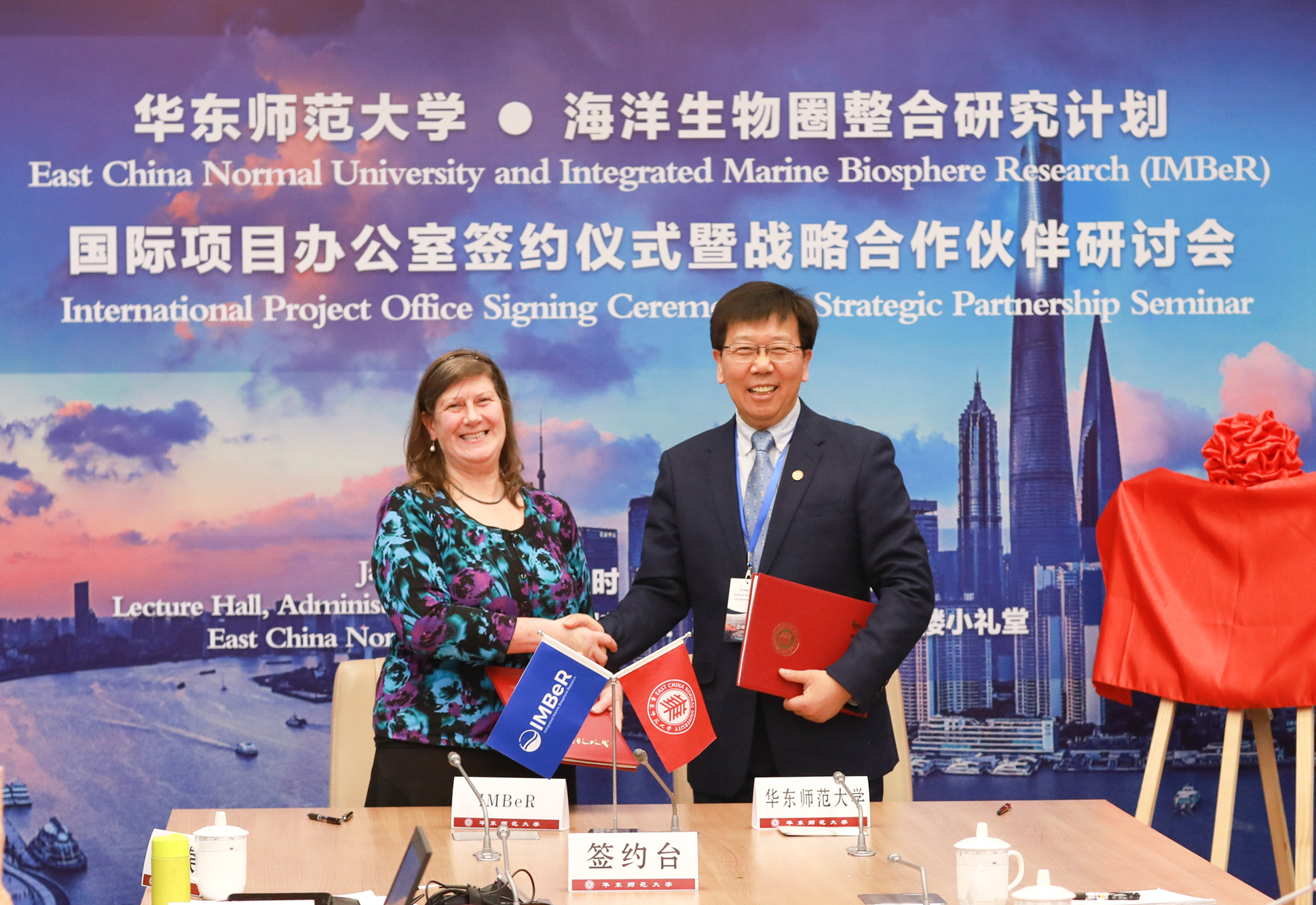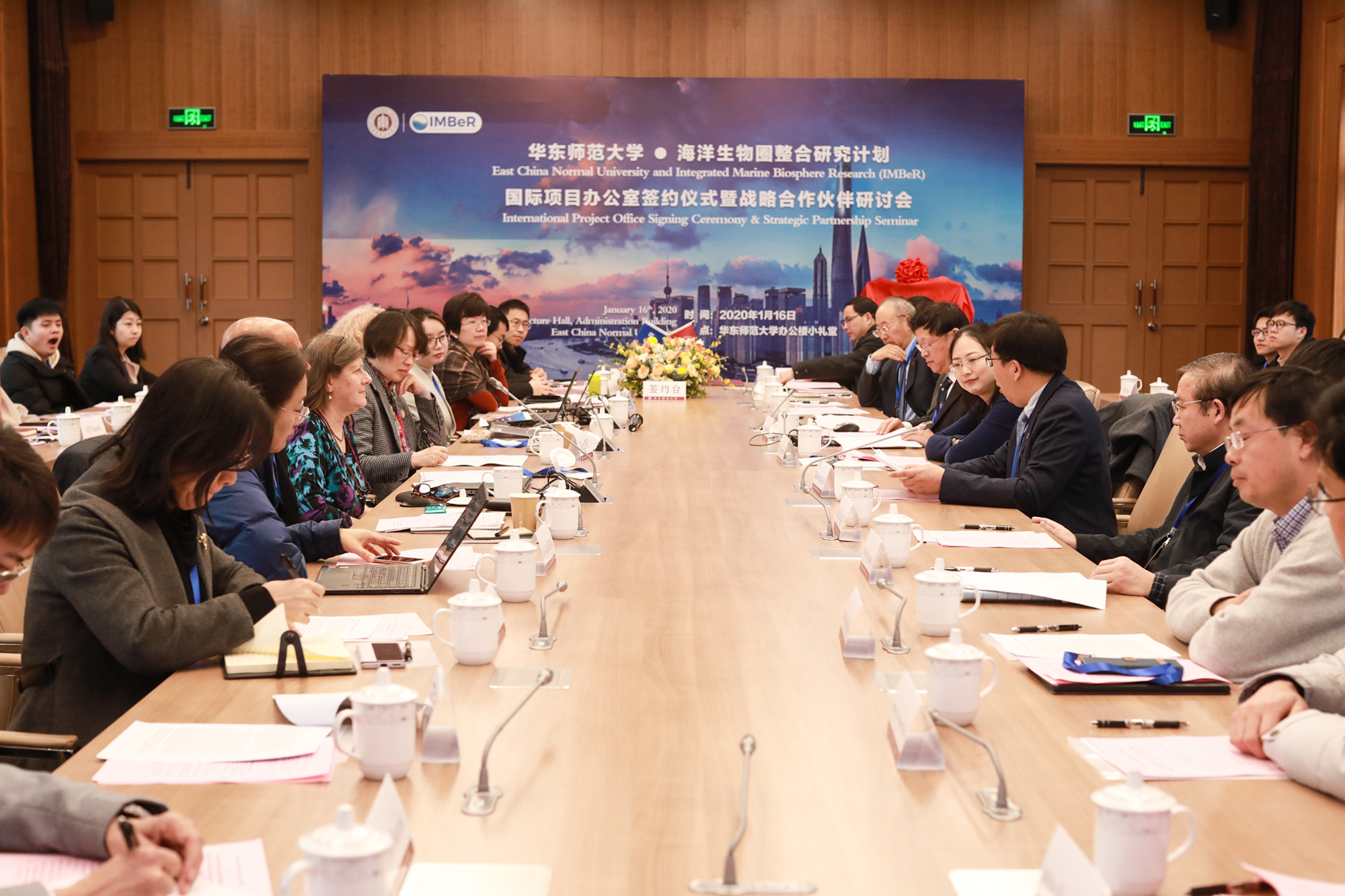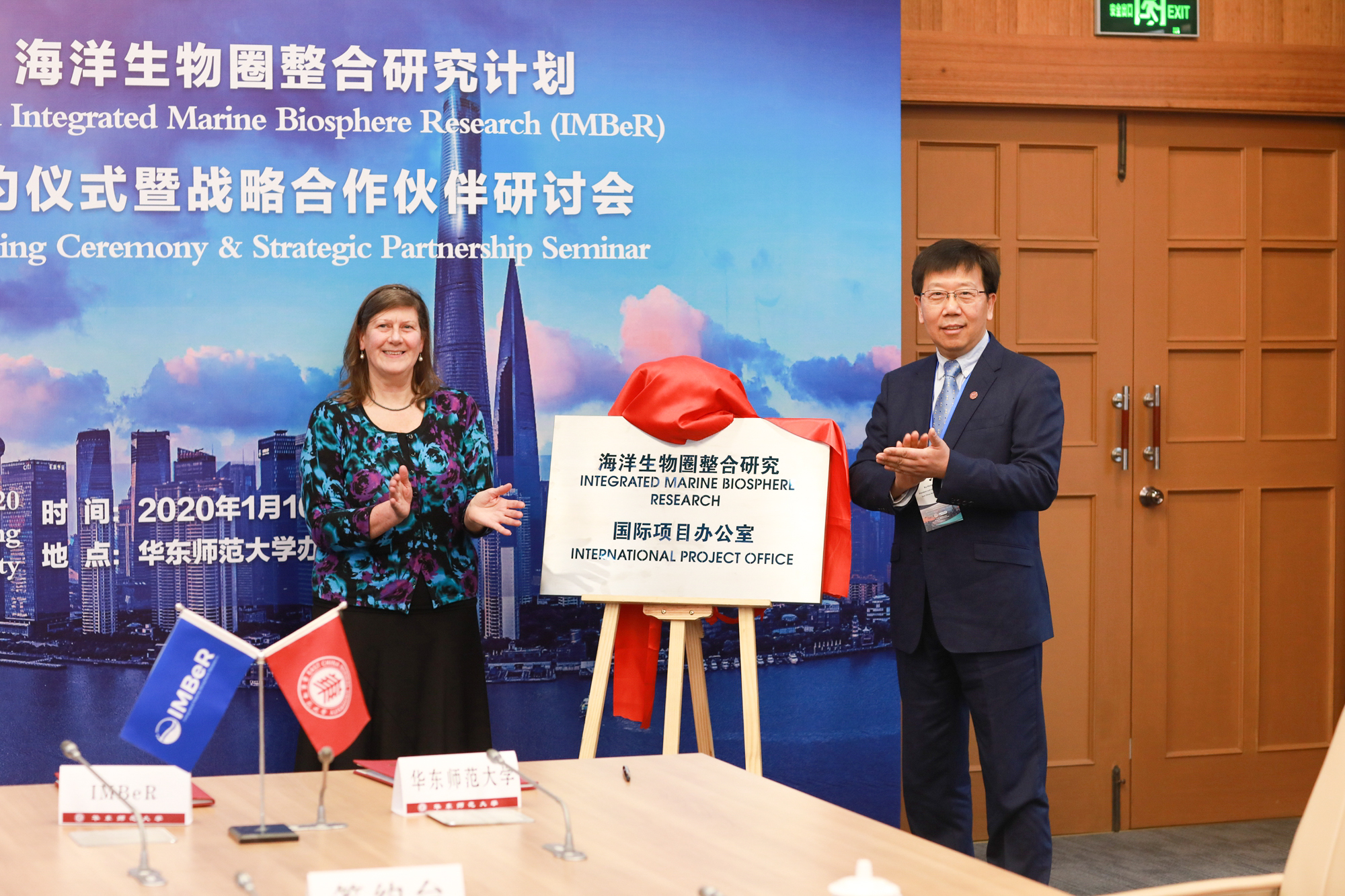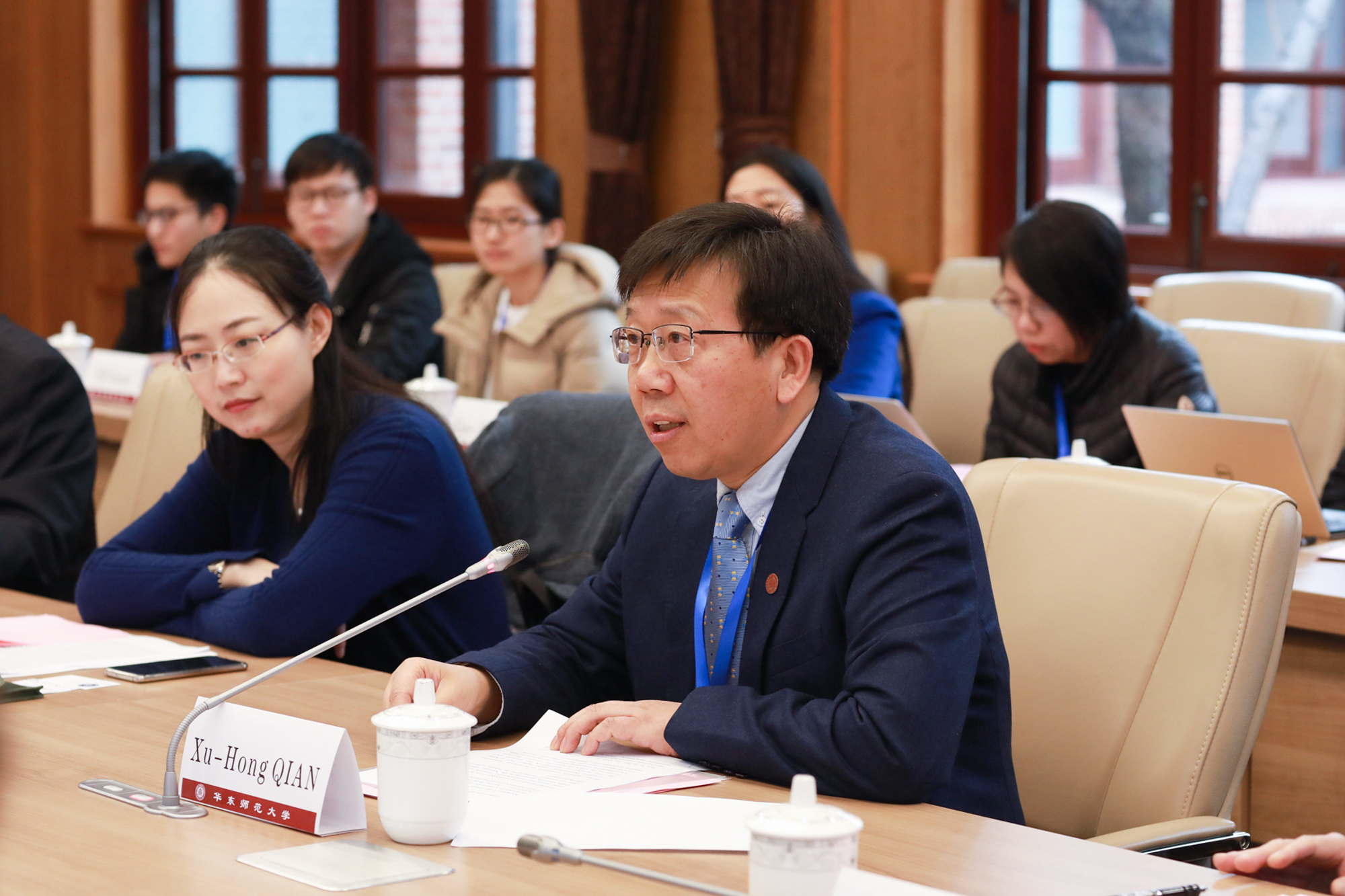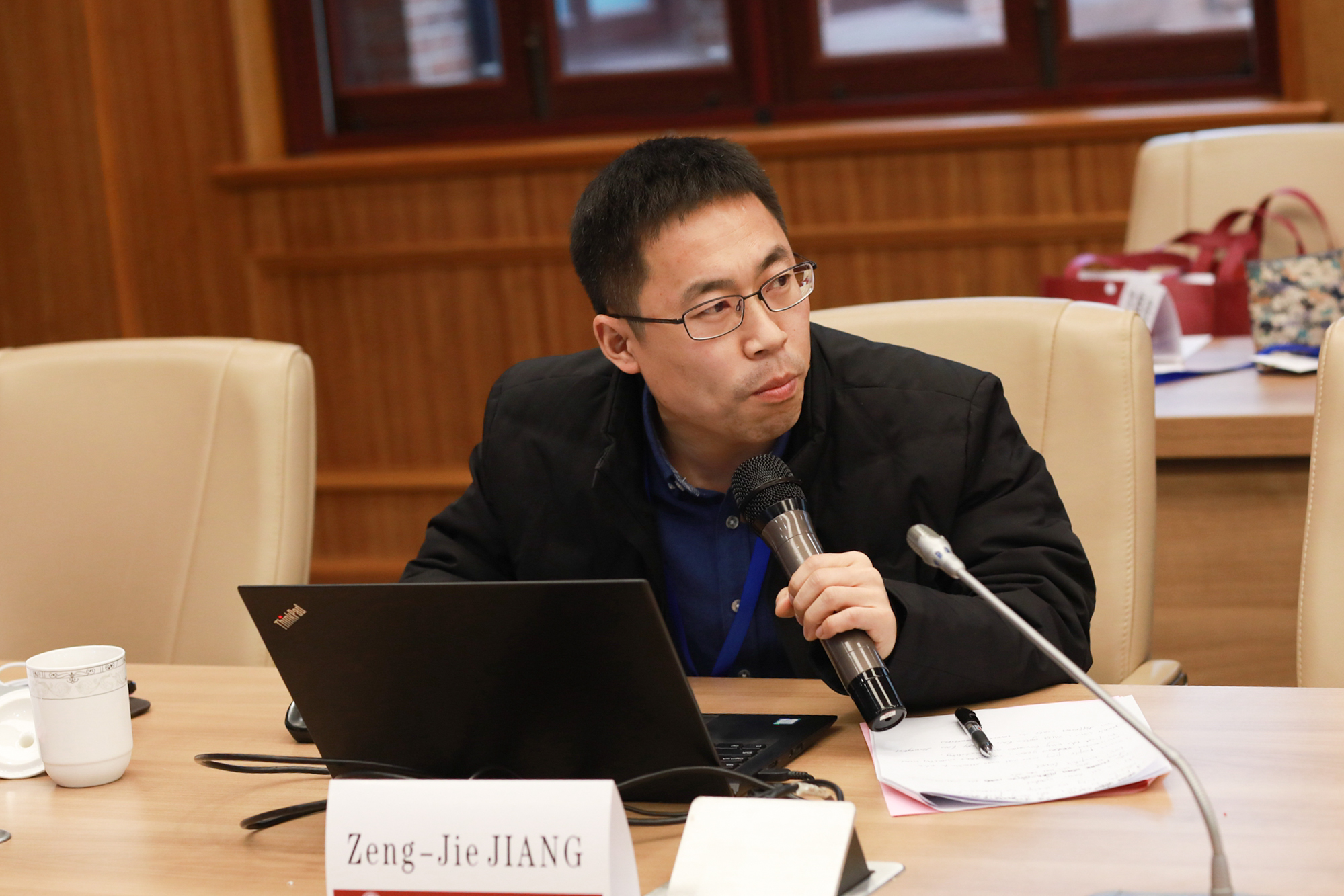How will global climate change affect the survival of the oceans’ top predators? How can the biogeochemistry and ecosystems of the Indian Ocean achieve sustainability? How do we deal with the contradiction of social and economic development, and ecological balance in the utilisation of natural resources in the Arctic and Chinese Continental Margins ? The International Project Office of the IMBeR science project hosted at the East China Normal University will explore the sustainable development of the oceans and human society under global change.
On behalf of both sides, Carol Robinson and Qian Xuhong, ECNU president, sign the MoU
Integrated Marine Biosphere Research (IMBeR) International Project Office (IPO)
On 16th January, the MoU Signing Ceremony and Strategic Partnership Seminar between the East China Normal University and the Integrated Marine Biosphere Research (IMBeR) project was held at the North Zhongshan Road campus. IMBeR and ECNU agreed that: ECNU will support the IMBeR IPO-China for a period of five years commencing from the date of this agreement. The IMBeR IPO-China will be responsible for promoting IMBeR research and supporting the implementation of the IMBeR SPIS (2016-2025), with a focus on the Asia-Pacific Region, the Middle East, and Africa; supporting and coordinating the activities of the following IMBeR Regional Programmes and Working Groups: Climate Impacts on Oceanic Top Predators (CLIOTOP) Regional Programme, Sustained Indian Ocean Biogeochemistry and Ecosystem Research (SIBER) Regional Programme, the Continental Margins Working Group (CMWG), and the Eastern Boundary Upwelling Systems Working Group (EBUS); undertaking educational outreach activities of IMBeR-related science; promoting capacity building of IMBeR relevant skills.
。
MoU Signing Ceremony and Strategic Partnership Seminar venue
The Integrated Marine Biosphere Research (IMBeR) project was originally known as the Integrated Marine Biogeochemistry and Ecosystem Research (IMBER) project. It had been initiated by the IGBP/SCOR Ocean Futures Planning Committee in 2005 as an international science project focussing on marine biogeochemical cycles and ecosystems. In 2016, IMBER became the core marine project of Future Earth and SCOR, and repositioned its research direction for the next decade (2016-2025) towards "Ocean sustainability under global change for the benefit of society" and renamed IMBeR.
IMBeR will work with several marine institutions and organisations in China and Canada, where a second IPO will be hosted at Dalhousie University, thus providing two independent but mutually supportive international project offices. After this signing ceremony, the IMBeR IPO-China will be established at the State Key Laboratory of Estuarine and Coastal Research, ECNU.
The ECNU President, Prof. QIAN Xuhong, and Prof. Carol Robinson, Chair of the IMBeR Scientific Steering Committee signed the MoU and jointly unveiled the IMBeR International Project Office plaque in the presence of all participants.
On behalf of both sides, Carol Robinson and Qian Xuhong, ECNU president, jointly unveiled the IMBeR International Project Office plaque
IMBeR Scientific Steering Committee member, Prof. WU Ying (SKLEC); Prof. DING Pingxing, Director of the Faculty of Earth Sciences; Prof. GAO Shu, SKLEC Director; Prof. HE Qing, Dean of the Institute of Estuarine and Coastal Research; Prof. TANG Jianwu, Overseas Dean of the Institute of Eco-Chongming; Heads of the relevant departments at ECNU; IMBeR IPO staff members; Ms. FANG Dejia, Deputy Director of the International Cooperation Department, Science and Technology Commission of Shanghai Municipality; experts from five China supporting institutes, as well as representatives of several international scientific projects, attended the ceremony.。
Cooperation with the IMBeR project has a long history
At the MoU signing ceremony, the ECNU President, Prof. QIAN Xuhong, mentioned that cooperation between ECNU and IMBeR goes back a long way. The two parties first signed an MoU to establish an IMBER Regional Project Office at ECNU in 2010. Within a few years, six major Chinese research projects had been successfully endorsed by IMBeR, and gained international attention.
Welcome remarks by Prof.QIAN Xuhong, President of ECNU
In recent decades, China's offshore ecosystems have experienced considerable changes due to the multiple and overlapping pressures of human activities and climate change. These have not only resulted in new challenges for existing ocean and fisheries management, but also affect employment and economy development in coastal regions.
In January 2011, in an effort to understand the response mechanisms and processes of offshore ecosystem responses to multiple pressures, the national program on key basic research project of china "Sustainability of Marine Ecosystem Production under Multi-stressors and Adaptive Management” (MEcoPAM) was launched. It was carried out jointly by SKLEC and four Chinese marine research institutions. From 2011 to 2015, based on the production and scientific research achievements, the project constructed abalone-sea cucumber-kelp and other forms of Integrated Multi-Trophic Aquaculture (IMTA) in Sanggou Bay, not only significantly increasing the economic benefits, but also reducing the negative effects of large-scale abalone cultivation on the ecosystem. The IMBER (renamed IMBeR since 2016) Scientific Steering Committee endorsed the project, and presented it internationally. The recently established IMBeR Continental Margins Working Group Chinese Case Study Team dealing with "Ocean Health and Sustainability in Chinese Marginal Seas" is led by its sub-project leader, Prof. Liu Sumei from the Ocean University of China. Version 2.0 of the original project will explore the changes of environmental, ecological and economic aspects in the marginal seas under multiple pressures, to understand the impact of humans on the marine environment in the process of ocean resource utilization, and its relationship with management policy.
Prof. QIAN also mentioned that the cooperation over the past nine years has made an important contribution to promoting the internationalization of SKLEC. Hosting the IMBeR International Project Office is an important part of the implementation of the "international +" Action Plan of ECNU, and an important starting point to improve the ability of scientific and technological innovation. It will play a facilitating role in promoting the construction of "double first-class" and becoming a world-class university with Chinese characteristics.
Remarks by Prof. CarolRobinson, Chair of IMBeR Scientific Steering Committee
Dr. John Claydon presented IMBeR’s strategicplan and future hosting arrangement
Ms. Lisa Maddison presented Progress of IMBeR Regional Project Office and IMBeR activities plan for 2020-2021
On behalf of IMBeR, Prof. Carol Robinson thanked the ECNU and SKLEC for their support over the years. She praised the work of the Regional Project Office staff, particularly the Deputy Executive Director, Ms. ZUO Fang, and looked forward to the upgraded International Project Office. In her remarks, she introduced IMBeR's scientific contributions to the marine sustainable development and the promotion of human well-being. Dr. John Claydon and Ms. Lisa Maddison, staff of the current IMBeR International Project Office, presented the strategic plan for the two International Project Offices and organizational structure of IMBeR, and reviewed the development of the IMBeR Regional Project Office, respectively, giving a high evaluation. They also discussed future IMBeR activities. John Claydon and Lisa Maddison will come to Shanghai regularly to work with ZUO Fang and QIN Kai (IMBeR IPO-China).。
Carol Robinson and staff members of the newly founded office
Prof. QIAO Fangli, Chair of the Chinese Science Committee on Oceanic Research and Deputy Director of the First Institute of Oceanology, MNR, sent a congratulatory letter to the International Project Office. Prof. ZHANG Jing from ECNU, representative of China IMBeR Committee, sent a congratulatory video with international students from a field work site in Bangladesh. Ms. FANG Dejia, Deputy Director of the International Cooperation Department, Science and Technology Commission of Shanghai Municipality; Prof. ZHANG Guiling, Deputy Director of the Key Laboratory of Marine Chemistry Theory and Technology (MCTL), Ocean University of China, member of Scientific Steering Committee of IMBeR´s sister project, the Surface Ocean – Lower Atmosphere Study (SOLAS); Dr. LI Wei, Council Chair of the School of Oceanography, Shanghai Jiao Tong University; Prof. CHENG Hao, Vice-Director, State Key Laboratory of Marine Geology (MGLab), Tongji University; Dr. WANG Yuntao, Associate Professor of the State Key Laboratory of Satellite Ocean Environment Dynamics (SOED), Second Institute of Oceanography, Ministry of Natural Resources; Dr. JIANG Zengjie, Researcher at the Yellow Sea Fisheries Research Institute, Chinese Academy of Fishery Sciences; Dr. Jose Santos, Executive Director of the CLIVAR International Project Office (CLIVAR – Climate and Ocean - Variability, Predictability, and Change); Prof. CHEN Jing (SKLEC), Executive Committee member of Future Earth Coasts; Prof. REN Jingling representative of the China Workgroup GEOTRACES, all attended the ceremony and gave congratulatory remarks.。
Research on China's marine environment from multiple perspectives
Keynote speech given by Prof. REN Jingling
Dr. WANG Yuntao, introduced the latest research outputs of the IMBeR-endorsed national key research and development project "Marine Ecosystem Modeling and Forecasting System in China Seas and Northwestern Pacific" (MEMFiS). The project aims to establish a high-resolution physical-ecological coupled model that can integrate multi-source observations and independently develop the operational numerical prediction system of the offshore marine environment (Bohai Sea, Yellow Sea, East China Sea and South China Sea) and the Pacific Ocean adjacent to China. This will improve the marine numerical prediction system of China, improve the marine disaster prevention and mitigation capacity, and ensure marine environmental safety for China.
Keynote speech given by Dr. WANG Yuntao
Dr. JIANG Zengjie, a member of IMBeR´s "Ocean Health and Sustainability in Chinese Marginal Seas" working group, introduced the potential impact of coastal mariculture on the marine ecosystem and possible ways towards achieving sustainable development.
Keynote speech given by Dr. JIANG Zengjie
These three invited speakers gave a good overview of some of the IMBeR-relevant research being conducted in China, and led to in-depth discussions, with many practical suggestions for collaboration and development of the IMBeR International Project Office inconjunction with the various supporting institutes and international scientific projects.。
Gruop photo
.
Written by: Guo Wenjun, Li Jing, Qin Kai
Edited by: Qin Kai
Proofread by: Lisa Maddison, Zuo Fang, Joshua Mayfield
Photos by: Yu Wenxi, Liu Jifeng

